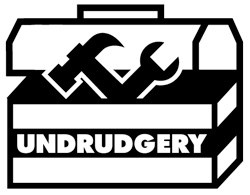 |
Vancouver is arguably the most beautiful city in the world to live in. For most, the goal is simply to live IN it. We all have to work, and work hard to keep up with Our Lady of VanCity, but there are a select few who know the score. Why not live in the world's most liveable city and hold down one of the raddest jobs she has to offer? We all know somebody who goes to work smiling. What are these jobs and how do people get them? More importantly, are they as awesome as they sound... |
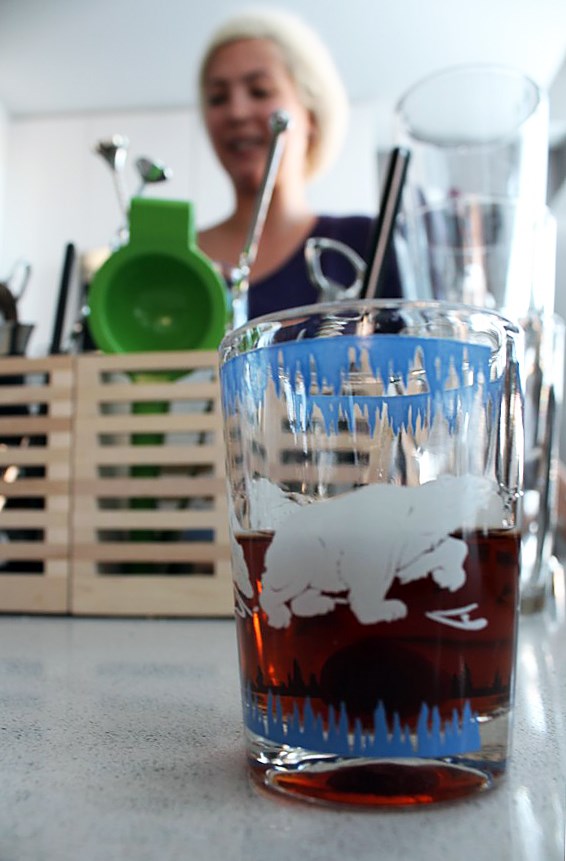 photo: Kelsey Klassen
photo: Kelsey Klassen
We're back! Take a moment to get reacquainted with Danielle's fascinating, encyclopedic knowledge of alcohol's history and diverse uses from Part 1. When we left off, the bartender was explaining the inspiration behind her apothecary-style cocktail menu at the Keefer.
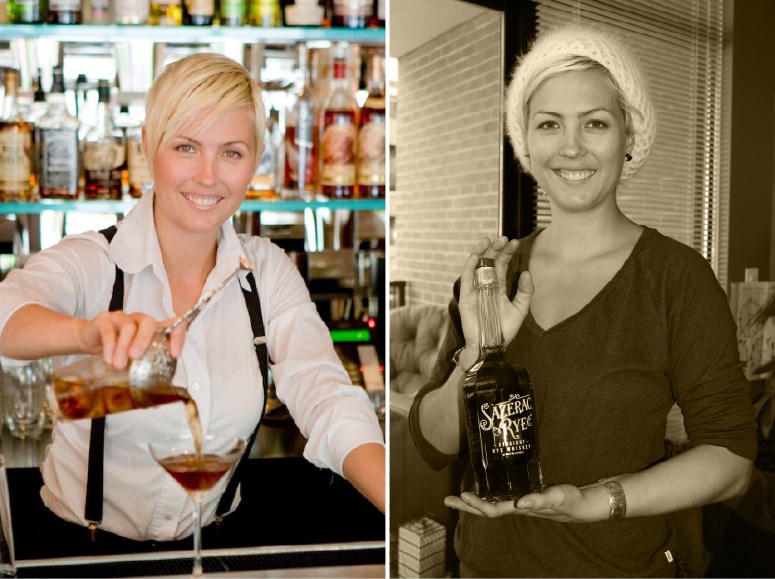 Photos: (L) Contributed, (R)Kelsey Klassen
Photos: (L) Contributed, (R)Kelsey Klassen
What's your favourite drink on the menu at the Keefer?
It's so hard because it changes. They're all so different and dependent on your mood. For me, talking about classic cocktails, generally if I'm going to sit down and have a drink it's more a spirit forward cocktail. So my top 3 favourite drinks are the Martinez, the Sazerac, the Manhatten - these are all very spirit forward, they don't have any juices. They're all just spirits and bitters. In a more lighter mood something like a Hemingway daiquiri or the gimlet.
On the Keefer list though, one of my favourites is called the Bold Fashioned. Just a simple twist on an Old Fashioned. You take house-made bitters and coconut water syrup with bourbon, a little bar spoon of the syrup and three dashes of bitters stirred, and then a lemon twist.
It's so interesting when you have drinks like that and you can play with the flavours. Everyone orders that drink, it's with a certain bourbon and they ask to have it with a different one, and you can but ... this is how it's meant to taste with that bourbon. The flavours from the coconut syrup bring out the flavours in the bourbon and...ya [laughs]
The rosemary gimlet is another one, that one was such a fluke! I created it last summer, and I wanted something just simple, easy to drink and easy to make, and refreshing. So I was like, gimlets are really easy to drink, it's literally 3 ingredients gin, sugar and lime juice and I wondered how to put a little twist on it - everyone does mint, we had already done a bunch of stuff with lavender, and there's the more out-there Chinese ingredients where not a lot of people would be like "Ooh, I want this in my gimlet!" so I tried to find something that was approachable for everyone who might not be into going right into the Chinese medicinal ingredients.
I had a rosemary bush on my balcony and made the drink and thought "Wow, people could make this at home." So many people have rosemary and lavender, things growing on their balcony. I tried it and it was so easy and simple and delicious. That's the good thing about that drink. It gets people into cocktails who might not necessarily like gin or have ever tried a cocktail. Back in the early 90s if people were drinking Candied Apple, its vodka, bar lime and grenadine, topped with 7Up - it's one of those sickly sweet drinks that sounds cool to order. The Rosemary Gimlet sounds cool, it rolls off the tongue and people who come there have already heard about it from other people. We don't put straws in it because you just use the rosemary to stir it. It's interactive. That one was a huge surprise.
Every season we change our menu and we take the best drinks from the past season and put them on the Keefer cocktail list. The cocktails that are signature to the Keefer are always growing. That's really cool because we find what people really like and that one, since we introduced it, literally we sell thousands a month. Some nights in the summer time we'd sell hundreds in one night.
Poor rosemary bushes!
I know! But they need to be used. That makes them grow. There's a really great business called Fresh Herbs ... I can't remember what they were called ... that approached us about getting these rosemary plants and growing them on the patio to use. I loved that idea but we go through so much we'd have bare bushes in one night!
Are you still working towards owning your own bar?
The great thing about the Keefer is I started out consulting and it was only meant to be a six month project and after six months we reviewed it and they wanted me to stay. Cam is a really great business owner and the incentive for me to stay was profit sharing and become more of a partner in the business. I've saved up money but I owned my own business all the time so I was paying off business debt and not able to put more money into my own business, so it would be stupid for me to turn that down. Now I can basically own my own business and the investment I put into it was the hard work of opening it, the hours - I didn't have to put my own money down because I had put so much time and effort in.
He saw that and the result was we're partners in the business. After ten years of trying to work towards opening my own bar I can say that I'm partners in a really cool bar in Vancouver and I was given the freedom to do a lot of things that many bartenders and bar managers, you come into a business with the whole concept already done, the bar is already designed.
When I came on I had the opportunity to design the back of the bar how I wanted it, to be functional. I always tell my bartenders how lucky they are to have such a cool space to work behind that's really functional. Like we have the centre block with all the garnishes and the cups sinks have foot pedals and the sprayers that wash the glasses and it's ergonomically designed so that more than one person can work behind there.
Even people who work on the floor are trained as bartenders so they know how to sell the drinks and and how to make them.
Do you test them every week?
Oh yeah. That's the one thing I brought from my experience in Australia, even though I'm not going to replace them if they don't pass, it still gets them involved in the learning process. I say to them, "You have this opportunity. With bartending you can work anywhere in the world. If you want to get better at what you do and travel and see the world it's a good way to do that."
You start by educating yourself. I have a library in the office. If they want to learn anything just take a book. I don't do the tests every week, it's every second week. When we have a staff meeting there's a test. So of it's about the Keefer, a lot of it is about history. Sometimes it's right there at the staff meeting like five questions. Last time, before I went away to Nicaragua I gave them an open book test for when I got back. As I'm getting them it's funny to see how much effort people put in, how different the answers are.
Is mixologist an actual term?
It is. It's been used for a really long time when bartending was in it's baroque stage and cocktails were becoming popular. Mixology, mixologist was a term that was used for these bartenders that were writing books and teaching people how to make the drinks. I think the term today, a lot of people don't like the term because it insinuates this snottiness but for me, I don't have that. A lot of people say "I'm not a mixologist I'm a bartender." I think that there's a difference. If I had just Designer Cocktail Company and didn't work behind a bar and wasn't regularly bartending, I'd still call myself a bartender but mixology would be the main thing I was doing - creating drinks for people. Bartender, bar manager, cocktiliian...
Are you still teaching?
Yes. I still do private classes at the Keefer. Groups of people come in and I'll do the classes on cocktail history starting with the Martini, throughout the years starting in the 1850s to today. Or the history of the Margarita. I've done those but it's hard, it's a balance because I also started the Bartender's Association just about two years ago now.
There was myself and a group of four other guys. When I started getting into it and realized there was a community, a lot of us became friends and there's lots of competitions that happen in the city and globally. We found that Canada and Vancouver in particular had such a great cocktail scene but there wasn't really any representation on a global scale. There wasn't any association where people could come together and learn more and network.
We did some research and there was in the 1970s a CBA and it fizzled by the wayside. Like flair bartending, which is totally different than craft cocktail bartending. It started with that conversation on why there wasn't anything. We started the Canadian Professional Bartenders Association in 2009, by 2010 we got the business license and non-profit association and started to get a few members. We just started an Ontario chapter, we have an Alberta chapter coming, Quebec soon and then Maritimes, Saskatchewan. It's kind of in steps to establish each province. We have members across Canada even if they don't have their own chapter.
Do you organize contests?
Contests, seminars, trips - all of that stuff for bartenders.
Is that how your trip to Nicaragua came about?
Ya, there was a cocktail contest, you win it and Flor de Caña takes you on a tour. It's this rum, produced in Nicaragua, basically it's a huge part of the culture there. This is probably one of my favourite spirits Flor de Caña 18 - you tour the distillery and see how it's made, the fields where the sugarcane grows and the barrels where it's aged and the culture of the product. It was so cool.
Why do they do that?
To build relationships with the people who are directly selling their product. It helps us recommend products to the association. Last year I got to go to Tequila and tour a Don Julio distillery. It was amazing to see how tequila is made because it is one of my favourite spirits. Every spirit is my favourite spirit but tequila is really interesting because of how it's made ... a lot of spirits are made from a grain or sugarcane, and they spend only a certain amount of time in the ground, whereas tequila - those agave plants spend up to ten years in the ground. It affects the spirit and you can taste the nuances of where it's planted and how long.
Does tequila get more expensive the longer it stays in the ground?
Not the longer it stays in the ground. There's different types of tequila, it's just coming back again, tequila was not cool because the only tequila you could get was Jose Cuervo Gold which is not even real tequila, it's a mixto tequila. One hundred percent agave is real tequila and then you have different categories of that: blanco, joven, reposado, extra añejo and those categories are how long they age it for.
A mixto tequila like Jose Cuervo Gold is not 100% agave it's 51% and the rest of it can be a neutral grain spirit. A lot of the time it's sugar cane or a raw cane spirit. Basically rum and tequila mixed together and not a pure spirit.
What is the definition of the word spirit?
It can be distilled from anything so you could take your mash... say we're talking about tequila or rum. Rum is distilled from molasses which is made from sugarcane. They take the sugarcane, press the juice and process that. From that process of making sugar you get molasses as a by-product. They kind of make a win from fermenting the molasses to make a low-proof alcohol. You take that wine that is low-proof and you distill it to concentrate it. There's different types of distillation processes, once you have that raw spirit you can choose to age it or not.
Do you experiment with distillation?
Because I've toured distilleries over the last two years I know how to distill it and I could. It's funny you ask - my dad has a farm in Alberta and he's a plumber and pipefitter and a couple years ago he showed me that he made a still. He knew I was getting more into spirits. If you know how to make them they're pretty easy, but you have to get a license. You can actually go and buy smaller stills, I haven't gotten to that point yet.
I saw one in the Rum Diaries ...
Ya, you can distill pretty much anything. All you need to do is ferment something and put it through that distillation process. There's always a danger with playing with high-proof alcohol though.
What's the best career advice you've ever received?
To do what you love. My parents always wanted me to go to university and become a dentist or whatever, and it wasn't really what I want to do. And then they said don't do what we want you to do, find out what you love. If you can do that and make your career out of that then do it. That's why I pursued this. I found something that I truly love and am passionate about.
Once I figured out it's possible to make a living as a bartender, learning about spirits and teaching people about spirits, and then you start realizing that there's other people out there and you become part of this community. I'm not the only one interested in spirits and you meet all these people who are just as or more crazy than me about spirits.
Do you have someone you look up to?
Yeah, there's so many people. A total inspiration to me, just looking at her career is Charlotte Voisey - a brand ambassador for Hendrik's Gin and William Grant whiskeys and spirits - she's a little bit older than me but same career path: started as a bartender and bar manager, consulting, and so when I was earning about cocktails I was like, "There's a girl just like me and she's made this a career."
And then moving back in history someone like Jerry Thomas, or there was a woman bartender in the early 1900s when it was a profession dominated by men named Ada Coleman at the Savoy Hotel. She was the powerhouse behind that.
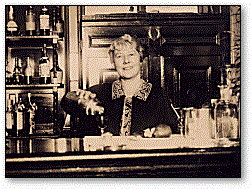 Ada Coleman, American Bar (London)
Ada Coleman, American Bar (London)
It's such a man-dominated industry but I think women can still be just as much a part of it.
Have you encountered discrimination?
Sometimes, yeah. Even just the other night - a lot of people come into the Keefer because they hear about it and they know me or they recognize me. But you get the people who just think I'm just another girl bartender who doesn't know what she's doing and there will be me and a guy behind the bar. So it happened where this guy had a couple drinks made from one of my bartenders and I started serving him in the area where I take over and he was like, "I'm just going to get him to make me a drink." And you're like well ...
I invented it?
Pretty sure he made the drink that I invented and that's the drink that you love ... but you can't say "I made all these drinks, and blah blah blah." [laughs]
What did you say?
Just that I'm pretty competent and can make a drink as well, just let me know what kind of flavours you like, and you can see the transition to, "Oh, she actually knows what she's doing, she's not just standing behind the bar looking pretty."
Wow
There's a stereotype you have to get beyond, that girl's aren't just servers. Once that happens, I always have a good laugh.
Why do you love the job?
It's an outlet for creativity. My mom is an artist - she didn't work as one, but was always pursuing art - and I love the artistic side of creating cocktail. Also that you can create something for someone right in the moment and get an instant reaction on whether or not they like it. With cocktails and spirits it's kind of like food, you have the aroma, the look, the taste, and you can affect someone's memories. You're creating an experience for them. That's the art of it. The different sensations.
You have people on a first date who may fall in love and maybe they met at the Keefer bar and the first drink they had together was the Rosemary Gimlet, it creates that special memory for them.
And they ask you to make it for their wedding?
Yeah! Things like that. The cocktail is creating a moment and a feeling.It's artistic and creative, but it's also fun and you meet lots of people. It's not a desk job. One day is never the same. You can prep and make the same drinks day in and day out, but at the end of the night it's always going to be something different. There's a mystery, you don't know what's going to happen.
What's your typical day like?
Well I get up early, no matter how late I go to bed, I wake up at 9:15 or 9 o'clock. I save the beginning of the day for myself. I go to yoga, have coffee and chill out and generally around 1 p.m. maybe read a book or something to do with cocktails and then go to work. Do some business administration stuff and then generally help open the bar and work a bit behind the bar. I don't really work behind the bar at the beginning part of the week I save that for the bartenders and come on more towards the end, so my week varies. Admin, development, training and the weekends I make sure I'm on the bar opening, but not closing so I can get a good sleep. I work 12-14 hours but always reserve part of that day to do something that's my own. I choose to work long hours. I like doing what I do.
It's been a goal for the last six months to cut down my hours, so I can do other things. I want to work on writing a book and doing more traveling with the bartender's association. I have so many cocktails I think any bartender who's been doing it professionally for a really long time, they have their book of cocktails. I'm making them every month, sometimes daily. I've been working on that for years now.
I just learned how to sail last year so another goal of mine would be do sailing cocktail tours, going to parts of the Caribbean and down south touring distilleries and the culture. I think it would be cool to go on a vacation for a week on a boat and sail to different ports and see and taste cocktails of the region. In Nicaragua, the national cocktail is a drink called the Macuá - you find that out and what people are drinking in different areas and sample them.
What's Canada's national cocktail?
It's the Caesar, technically. They just celebrated the 40th anniversary of the Caesar. I like Caesars but I'm not a huge fan of the mass produced version because if you look at the ingredients for Clamato the second or third ingredient is MSG, so we don't serve Caesars at the Keefer because of that. We used to make the Clamato ourselves fresh - the tomato juice, clam juice and all the spices - but people weren't coming in to order a Caesar and you had this mix that was going bad, so there was no point in making the fresh mix. The few people who come in saying they really wanted a Caesar we'll get them to try this drink that we made called the Bloody Ming - guava juice, lemon juice, spices and they end up loving that.
Besides the Caesar, there is a drink I found out about when I was in Quebec called the Sortilège Sour - a maple syrup whiskey liqueur. It's sort of a national spirit or historic spirit of Canada out east. You have maple syrup and whiskey, it's a no brainer to combine them. You know how the margarita or the gimlet is three ingredients, the sour is lime juice or lemon juice. You don't even need to shake it, you can just stir it on ice. I think it's a really symbolic Canadian drink.
What's your favourite:
- Charity: The Downtown Eastside Women's Centre for years and years because when I owned Garnish Girls I had an office right near there. It's close to my heart because even in my family I've had cousins and aunts that ended up in not the greatest place so a community organization that helps women in the DTES is important to support. We did a fundraiser for them in February and I donate anything I can.
- Neighbourhood: I'd say Chinatown. I've been in East Van for the last five years and I've been in Vancouver for about 10, so I really have an affinity for this area. The history of Chinatown and Gastown really drew me to it. It's a mix of people from the down and out to people are living in amazing lofts. I also love Pacific Spirit Park way out in UBC, if I have the day free I'll go there and walk around. It's in Vancouver but it's like a little vacation. Drive 20 minutes and you're in the forest.
- Apothecary: There's one on the corner of Pender and Columbia that I always go to. Union and Gore - there's a few I go to and they all have different vibes. Some people are more helpful than others and if you find someone that speaks English then it's a little bit easier.
- Place to grab a drink: I don't go out a ton, because I work so much, but ... there's so many good places in Vancouver. It's more about the bartenders. The Diamond has a really good cocktail program and it's close to where I am. The Refinery on Granville Street is really cool. L'Abattoire in Gastown. The Cascade Room on Main Street. West Restaurant, the bar manager there is a good friend of mine, he's awesome. Calabash, they have live music and great food. I used to live half a block from there that was one of the places I'd always end up going for a bite and a rum drink. Jay, the bar manager there, is amazing. They're always great drinks. Over the last two years that was the main bar where, if I'm not working at the Keefer, you'd find me. Oh, Chambar. But I don't find myself in there nearly enough.
I go to Medina every day for their lavender lattes. And to the Dirty Apron.
Are you picky about all beverages you consume?
I find things that I really like and I always go back to them, like the lavender latte. I can make lavender syrup. I can make coffee. But I'll never end up doing it for myself, I just go there.
How do you relax?
Go to the beach, or for a walk. If I'm working a lot I just walk around the area. I love finding new things in the neighbourhood and go to the different apothecary shops to find out what the different herbs and stuff are. They find it interesting that this blonde girl is coming in buying all these crazy herbs. I'm not a certified naturopath, but that's a next step of learning more. It's just like bartending to me - self-taught learning, going online and figuring it out. Talking to people in the stores.
Is there any risk involved with herbal medicine drinks?
No, but say if we're using the wrong herb that I didn't know enough about. I had a friend into Chinese medicine and she saw that I had a bag of herbs and she said to not use them no matter how little, it's a laxative! I totally mistook what it was because of the translation. We test everything, and right now we have 12 or 15 different herbs we use on a consistent basis and every one of them I know what it's used for. Things can be similar - pronunciation and research is important.
What are some perks?
Alife sponsors our shoes and that's fun. Even just liqour sponsorships have its perks. You get to go on trips or have their first released spirit.
What's your career highlight?
The trips are definitely a highlight. In the last two years I've been to New Orleans, Kentucky, Nashville, Mexico, Nicaragua, France, Spain, Holland all for cocktails. That's probably the coolest thing - to travel and work. You still spend your own money when you're there but you get a free trip and an amazing experience. Walking into Don Julio distillery and seeing, 'Welcome, Danielle." Not a lot of tourists get the full deal.
Do you recommend an intro book on cocktails?
Imbibe by David Wondrich. It's basically a direct history of the cocktail from early until now. Then there's an older one - Jerry Thomas's How to Mix Drinks is really cool. The King of Cocktail, Dale Groff is a good one as well. I used to sleep with Imbibe under my pillow so that's top favourite for me.
What's your parallel life career?
I probably would have gone to university to become a cultural anthropologist or something along those lines. I don't know where that would have taken me.
Have you been approached to lecture at a university?
No, but this year I'm going be doing a seminar at Tales of the Cocktail, a huge festival in New Orleans that happens every year. I'd be doing an hour and a half seminar on Chinese Medicinal ingredients in cocktails. I had a writer who I had met at TOC last year, and he was intrigued. He came into the Keefer and was surprised and said no one was really doing this on this scale. We were inspired by a concept called Apoteke in the States. They do apothecary-style cocktails but they don't incorporate Chinese medicinal ingredients into them. One of the coolest articles I've had done about me was in a magazine called Herbal Gram, like nothing to do with cocktails, it was a herbalist trades magazine.
How much does it cost to start a collection of booze and tools for hobby?
I started with about $1200 on 3 or 4 types of every kind of spirit and collected from there. If you want something of everything you're going to spend at least a thousand dollars, and then there's all the tools. There's a place online called Cocktail Kingdom, a good place in Vancouver is Gourmet Warehouse - they have bitters and they have all the tools, like a good basic set. I collect antiques though, so antiques stores are great. You can spend as much or as little as you want, but I've never had less than 50 bottles.
Danielle started reminiscing about that first night making drinks, at her parents' party when she was a kid, and layering with the spoons and playing with the bottles, and then burst into a big smile and said, "I feel like I should make a drink!" She proceeded to cap off one of the most interesting interviews I've ever conducted by whipping up her personal favourite, The Martinez with, among other things, her favourite antique shaker from the 1940s, cherry bitters - aged for three months and vermouth (which I learned can go bad if not refrigerated).
She also simultaneously conducted a minor history lesson on the disturbing evolution of maraschino cherries from royal delicacy to chemical sponge and explained where the expression blind drunk comes from.
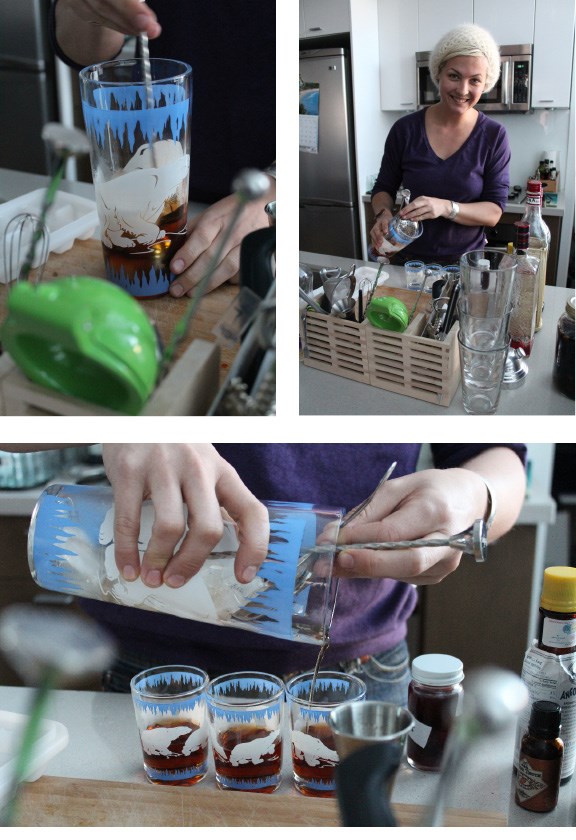 photos: Kelsey Klassen
photos: Kelsey Klassen


